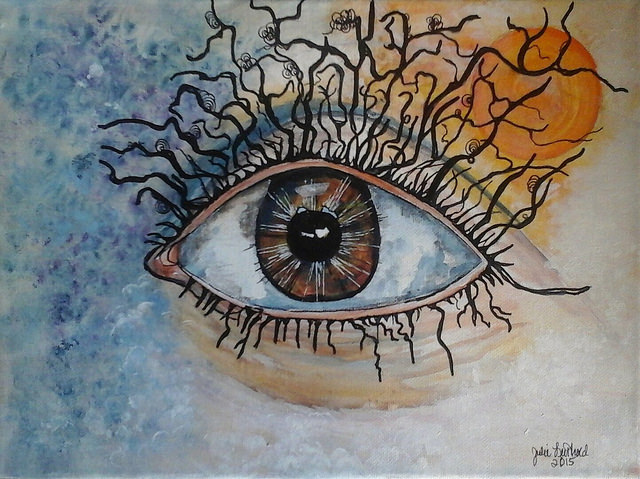
Trichotillomania. I don’t expect you’ve heard of this before?
I’ve yet to meet anyone who is familiar with the word or the condition. That’s partly because I’ve never spoken openly about my own personal affliction with this “disorder.”
Trichotillomania (TTM) is referred to as a “hair pulling disorder,” and it entails just that—pulling out your own hair. The exact causes are unknown, but stress, anxiety, and trauma have all been accredited as likely contributors.
I’ve been pulling out my own hair for about two decades. I’ve hidden the fact that I pull out my hair for nearly all this time. I confessed to my mum via email back in 2011, but never told another soul until earlier this year, when I told my boyfriend and my brother—and now…all of you.
Imagine the fear and the shame that locks a person into silence for 12 years. In fact, I have a feeling that many of you don’t even need to imagine this; I think quite a few of you may know exactly what this particular breed of captivity feels like.
I started pulling when I was 10 or 11 years old. I absentmindedly plucked out all my upper eyelashes, and then I moved on to my head. When bald spots started appearing and kids started snickering, my mum took me to the doctor. He asked me, “Are you pulling out your hair, Anika?” I lied and shook my head no, because I was too ashamed to reveal the truth. He concluded I had ringworm and that closed the matter.
Most days, I will pull out my hair. I go into a sort of trance and just pluck away, sometimes for over an hour. Over the years, I’ve mastered the art of lying, deception, and concealment. I like to think I’m perfectly equipped for espionage.
But, it’s not Bond girl-esque glamour that tethers me to the shadows; it’s the overwhelming terror that if people knew what I did, I’d be deemed a pariah, an outcast—ugly, weird, unworthy, unacceptable, and unlovable.
Trichotillomania is sometimes regarded as a behavioral disorder, similar to pyromania or obsessive-compulsive disorder (OCD). I’ve come to understand it as a coping method.
Coping methods. We’re so familiar with drug addiction, alcoholism, sex addiction, and eating disorders as being sicknesses in their own right—but we fail to comprehend that these are merely symptoms of a deeper-rooted disturbance. Generally speaking, these often stem from a lack of love or meaningful human connection.
Pulling out my hair is my coping method. It’s not as well known as the others, but acknowledging this as the manifestation of some deeper-rooted pain has been a pivotal step in my overcoming the disorder. Finding out that this was, indeed, a coping method—and not merely an isolated sickness—was the result of “Honest Conversation.”
“Honest Conversation” is my personal style of journaling. I started by writing it all down—everything I could remember—as honestly as possible, with no glorifying a falsely idyllic childhood and no skipping over the uncomfortable truths.
This raw and unabridged dialogue allowed me to gain tremendous clarity on what it was that was truly causing me pain: namely the stress and anxiety I felt as a child from the tension in my parents’ relationship—and the belief that it was somehow my responsibility to please them enough, so that they would stop fighting. (Cue perfectionism, judgment, comparison, control issues, and overachieving.)
This newfound clarity gave me the confidence to start taking my words off the page and start speaking about this to the people I felt safe with. Sharing my suffering opened up a whole new world that I simply wasn’t expecting.
As I discovered, many—if not all—of my friends, family, and loved ones have suffered in their own ways. And, once I’d told someone my story, they usually had a tale of their own to share. Every single person has been so thankful and relieved to finally get it (whatever their “it” may be) off their chest! It seems as though we all have something we’re too scared or ashamed to reveal, and over time, these burdens can be very destructive for our well-being.
Sharing my experience (and being a safe space for others to do the same) has shown me that a willingness to be vulnerable and honest opens the door to love and healing.
I rarely feel the urge to pull out my hair anymore. I still have days when I find myself stressed out and anxious, but now I know that instead of returning to my old coping method, what I really need is an honest conversation—either with myself in my journal, or out loud with a loved one. The more I communicate, the more I’m able to heal that original pain and help others in return.
I highly recommend journaling. It’s the best way we can begin asking those hard and seemingly impossible questions that we’ve been too afraid to even formulate in our heads. When we give ourselves permission to ask, the answers are often ready and willing to flow out onto the paper. Whether or not you choose to share is entirely up to you; but writing and journaling can be the first and most important step toward honest communication, which leads to healing, reconciliation, and ultimately, back to love.
~
Relephant:
How I Finally Stopped Pulling out my Hair.
When Being Naked Requires More Than Taking Off Clothes.
8 Natural Tips for Coping with Anxiety.
~
Author: Annie Jane
Image: Flickr/Julie
Editor: Yoli Ramazzina
Copy editor: Callie Rushton
Ready to join?
Hey, thanks so much for reading! Elephant offers 1 article every month for free.
If you want more, grab a subscription for unlimited reads for $5/year (normally, it's $108/year, and the discount ends soon).
And clearly you appreciate mindfulness with a sense of humor and integrity! Why not join the Elephant community, become an Elephriend?
Your investment will help Elephant Journal invest in our editors and writers who promote your values to create the change you want to see in your world!
Already have an account? Log in.
Ready to join?
Hey, thanks so much for reading! Elephant offers 1 article every month for free.
If you want more, grab a subscription for unlimited reads for $5/year (normally, it's $108/year, and the discount ends soon).
And clearly you appreciate mindfulness with a sense of humor and integrity! Why not join the Elephant community, become an Elephriend?
Your investment will help Elephant Journal invest in our editors and writers who promote your values to create the change you want to see in your world!
Already have an account? Log in.
 Share on bsky
Share on bsky





Read 0 comments and reply